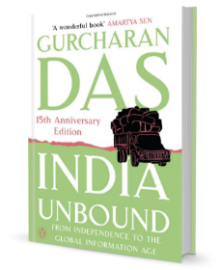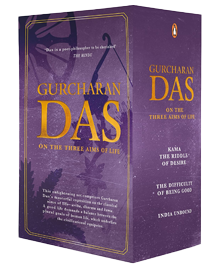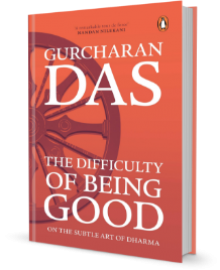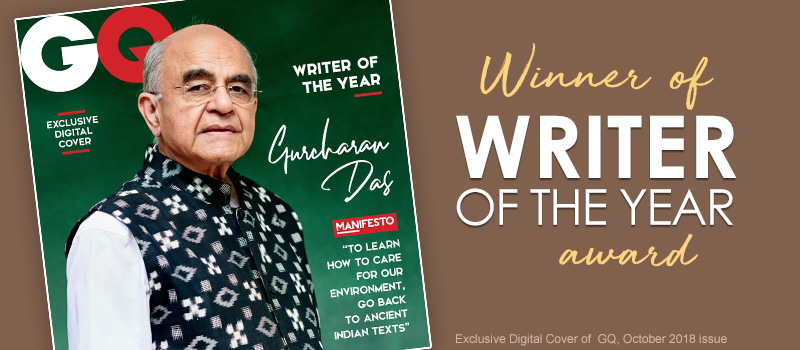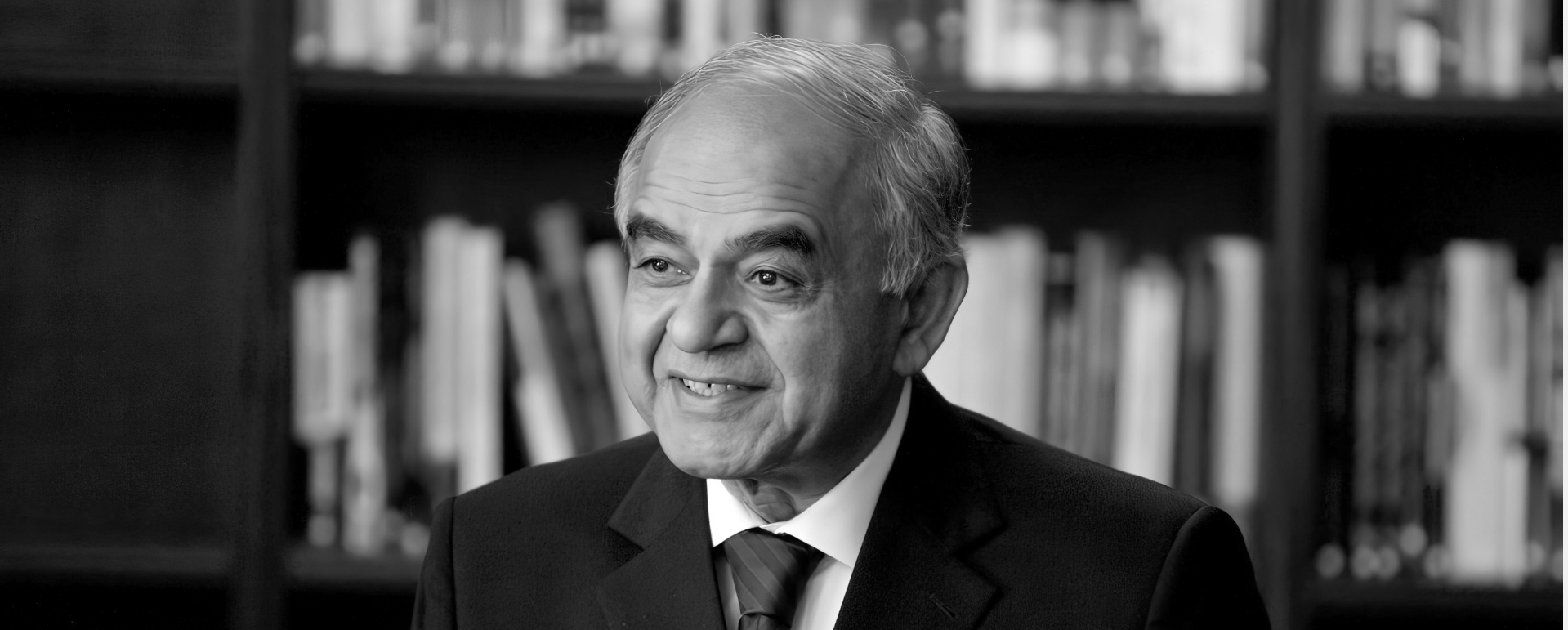
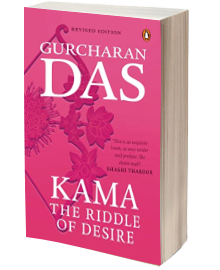
Kama: The Riddle of Desire (paperback)
A RIVETING ACCOUNT OF LOVE AND DESIRE 'This is an exquisite book, at once tender and profane, like desire itself' Shashi Tharoor 'With this book and others, Das has established himself as a truly modern Indian thinker' Sanjaya Baru, The Week 'Das has created this sense of enchantment . . . He is a poet-philosopher to be cherished' The Hindu 'Das's unique success is to tell the Indian story of "desire" which is much beyond sexuality' Indian Express 'If you are someone who has ever loved, or lost, or dreamed of loving, or is frustrated by its paradoxes, this book is definitely for you' Scroll.in
India is the only civilization to elevate kama-desire and pleasure-to a goal of life. Kama is both cosmic and human energy, which animates life and holds it in place. Gurcharan Das weaves a compelling narrative soaked in philosophical, historical and literary ideas in the third volume of his trilogy on life's goals: India Unbound was the first, on artha, 'material well-being'; and The Difficulty of Being Good was the second, on dharma, 'moral well-being'. Here, in his magnificent prose, he examines how to cherish desire in order to live a rich, flourishing life, arguing that if dharma is a duty to another, kama is a duty to oneself. It sheds new light on love, marriage, family, adultery and jealousy as it wrestles with questions such as these: How to nurture desire without harming others or oneself? Are the erotic and the ascetic two aspects of our same human nature? What is the relationship between romantic love and bhakti, the love of god?
-
1)"Kama: The Riddle of Desire is a book about desire in the fullest sense of the word—it is about love and vulnerability, about self-doubt and betrayal, about wanting more of everything and being haunted by settling for less….When we read Kama, Das offers us a journey into the life of a body as much as the life of a mind, and in Das' narrative, the body diminishes through life but the mind expands. There are multiple strands in this complex book which is part memoir, part treatise, part life-lesson and most obviously, a tantalising roman-à-clef. "
-- Open Magazine 5 Oct 2018 (by Arshia Sattar) -
2) "If you are someone who has ever loved, or lost, or dreamed of loving, or is frustrated by its paradoxes, this book is definitely for you."
-- Scroll.in 6 Nov 2018. -
3) With an astute mind and a romantic eye, Das pieces together the riddle of desire, leading to the meaning of life. He concludes, like Proust, that 'what matters in life is not whom or what one loves… it is the fact of loving'… He deserves praise for tracing the history of kama and its multiple strands across the history, cultures and philosophies of both the East and the West.
-- Hindustan Times, 10 November 2018 -
4) "Das has created this sense of enchantment, using memory as a device to summon the many forms of desire that play upon the mind [thus] entering an imagined world of beauty…. In evoking those moments of beauty in a lifetime of memories, Gurcharan Das is a poet-philosopher to be cherished."
-- The Hindu, 11 November 2018. -
5) "A fascinating narrative, it weaves the story of Amar, the protagonist, into a philosophical journey… It could have been a treatise, instead it's a grand novel with a gentle message of acceptance. Not unlike Michel Foucault's History of Sexuality, which is a study of Western concepts, Das's unique success is to tell the Indian story of "desire" which is much beyond sexuality…So seamless is the plot created by the author, it is the greatest kind [of fiction] that speaks of an era of social transformation."
--Indian Express, 17 November 2018. -
6) "With this book and others, Das has established himself as a truly modern Indian thinker grappling with the complexity of the mind of the urban middle class Indian.
--The Week 28th Oct 2018 -
7) "With empathy, effortless humour and doses of the philosophies of the great masters, Das examines romance, love, rejection, nuptials, family, infidelity, ennui and jealousy in the relationship of a couple. His book challenges the reader, placing paradoxes and riddles before him…The key word is balance, which underlies the civilisational equipoise— a good life demands a balance between the plural goals of human life."
-- The Tribune 16th Sep 2018 -
8) "It is a ground-breaking narrative that is engaging and enlightening, shedding new light on the irresistibility of desire. It assigns new meanings to kama and tells us that it is our duty to live every moment as though it were our last because making creative use of kama serves a higher purpose of life."
--Business Line, 10 Dec 2018 -
9) "Is there rea¬lly, one wonders, 550 pages worth of fresh insight into what Das describes as a 'sense-intoxicating emotion'? As it happens, there is, and Kama is a creditable attempt to encapsulate in a single, voluminous tome the author's informed grasp of the subject of desire. The prose flows smoothly…and there is strength in Das's exposition, enriched by an insightful reading of texts."
--Outlook India 5 Oct 2018 -
10) "This is an exquisite book, at once tender and profane, like desire, itself."
--Shashi Tharoor -
11) "This is the third book in Gurcharan Das's magisterial opus on the Hindu concept of the four goals of human life (purusharthas), and that rich background allows Gurcharan Das to view kama more broadly than it has ever been viewed before. Not just sex, or desire, and not even just pleasure more broadly conceived, but love in its deepest and richest sense, including all of the Indian tradition, from the Vedas to modernity, even catching up Marcel Proust in its graceful coils.
--Wendy Doniger, Professor, University of Chicago -
12) "It's a huge achievement. The way he alternates narrative with philosophical reflection and analysis is really brilliant. Each strand enhances the other in a way that is really original – and brave. I'm sure there are many people who would say that combining elements in this way wouldn't work And yet it absolutely does!"
--Carole Satyamurti, English poet and author of Mahabharata (Norton) -
13) "Like Kama, Gurcharan Das too has five arrows in his quiver: philosophy, literature, psychology, art and most potent of all, insight. It is armed with all that he approaches—soft- footedly—the subtle landscape of desire."
--B.N. Goswamy, art historian and critic -
14) "In a fictionalized memoir of one man's experiences of love and loss, interspersed with fascinating meditations on love, longing, lust and nostalgia, the author records a life as he moves effortlessly through a vast and astonishing range of Indian and world literature from the Rig Veda, the Sanskrit epics, the Bhagavad Gita and Vatsyayana, to Shakespeare, Proust, Tolstoy, Freud, and many more, with insightful excursions into the bhakti poets and the operas of Richard Wagner. Das has given us a moving and thought provoking insight into the inner workings of the human heart"
--Prof Robert Goldman, Professor, University of California, Berkeley
